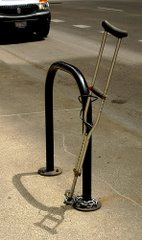
Pity is a hot topic on the
disability blogs, usually in the context of “I don’t need your…”. Only recently did I come to a personal understanding of what pity was, and it had nothing to do with disabilities.
Over time, I’ve come to understand a certain friend of mine to be pretty annoying and sometimes impolite and rude. I call him a friend because I had always made conversation with him, found him at times interesting, participated in social events with him, and helped him when times were tough. This friend had been slowly wearing down my nerves as he unabashedly refocused all attention on himself. He would be selfish and sometimes mean, all for the sake of commanding attention. Now lest the pot be calling the kettle black, I also enjoy when attention is focused on me, but I understand that desire and try to keep it in check. This friend was not aware of what he was doing.
At one social event recently, the negative sides of his personality shone much more brightly than the positive ones, and I was not the only one upset with him. We tried as best we could to be polite and engage him gently even though he provoked us and made harsh and unnecessary accusations against those he called his friends.
In this most extreme of situations, I had the realization that surely the only thing that could drive someone to act this way was a deep need for attention, love, and friendship. It was at that moment that I decided to really be his friend. I could have given up on him, angry from his taunting. But instead I saw how much he needed someone, and how sad his situation was, to be so lonely and needing to be loved that he would go to such extremes. So instead of hating him, I felt sorry for him because he could not see the painful root of his actions.
In later reflection, I realized that this was an act of pity, a loving act where I claimed to know him better then he knew himself, and excused him for the wrongs he had done.
So how does this experience relate to disabilities? Many able bodied people see the disabled as people wearing their flaws on their sleeve, and they are compelled to help, to sympathize, and to show pity. The pity itself is not the problem. It is their presumption that a person with a disability has a problem, a flaw, something to be ashamed of, or be embarrassed about. They don’t realize that peoples with disabilities lead normal lives.
Therefore the fault in the able bodied population is not their impulse of pity, which can be a loving thing when carefully examined and used sparingly. The problem is the premise upon which their pity is founded, that a disability is a flaw. That is what the world needs to unlearn.



